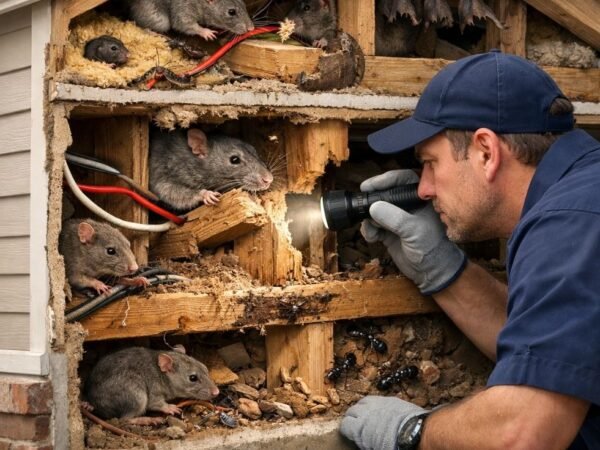A break-in occurs every 26 seconds in the U.S. This alarming statistic highlights the critical need for enhanced security systems, especially in vulnerable environments. With crime rates fluctuating and technology advancing, installing a security system is no longer a luxury but a necessity. Home security solutions have become integral to safeguarding your property. Here’s why property owners should commit to a reliable security system.
Types of Security Systems
Modern security systems come in different forms, meaning various residential and commercial property options exist.
Traditional Security Systems
These systems employ wired setups and have essential components such as door and window sensors, alarms, and keypads. They are reliable and serve the purpose of a standard security system but cannot compete with newer versions.
Smart Security Systems
Intelligent systems will integrate the latest technology advances, such as live video monitoring, motion detection, mobile apps for remote access, and real-time alerts for homeowners, making convenience and control greater and more automatic.
Intelligent systems are especially beneficial in high-density housing environments, where managing security through traditional means can be challenging. One notable advantage is multi-family residential live security camera monitoring, which allows property managers and residents to monitor shared spaces and building perimeters from anywhere. This is crucial for preventing theft, ensuring the safety of communal areas, and providing a quick response to any security concerns.
Commercial Security Cameras and Systems
Customized systems for businesses provide 24/7 live video surveillance, access control, and analytics that track employee activity and customer traffic. These tools protect assets and optimize operations.
Hybrid Security Systems
Hybrid security systems combine basic wired settings with advanced innovative and wireless features. They are great for significant buildings that cover a vast space and require much broader features with proper functionality.
Why a Security System Is Necessary
Your home is more than setting locks or securing tight windows. Security systems offer multi-faceted protection of persons, possessions, and peace of mind.
Deters Crime
It has been proven that live security cameras can deter burglary attempts. Studies show that security cameras cut down property crimes by around 20%. Installing home security cameras and signs that show active surveillance efficiently deters the commission of the crime.
Business security cameras offer further protection. Cameras deployed in strategic locations discourage theft and vandalism, among other crimes.
Ensures Faster Response to Emergencies
Modern systems will alert emergency responders instantly at any breach or fire, among other things. This is enabled with features such as live video surveillance, where the monitoring professionals will authenticate the incidents and promptly call the local authorities. This lowers the response time and damage when it occurs.
Safeguards Valuables and Data
Security systems protect what’s most valuable to you, whether heirlooms, electronics, or sensitive business data. Advanced systems with home security cameras provide constant monitoring, ensuring your items are safe even when nobody is around.
Benefits of Installing a Security System
In addition to preventing crime, security systems provide many other benefits to a property’s safety and functionality.
Peace of Mind
Knowing your property is protected, you can focus on other aspects of your life. Whether on holiday or working, you can watch your property through live video monitoring or real-time home security cameras.
Savings on Insurance Cost
Home security companies often offer discounts on home insurance for homes with security systems installed. A camera system included in the home security package and alarm capabilities can help reduce your monthly premium, providing safety and savings simultaneously.
Increases Neighborhood Security
Properties with visible business security cameras or residential monitoring systems protect their owners and make neighborhoods safer. Criminals are less likely to target areas with widespread security measures, reducing overall crime rates.
Flexibility and Scalability
Security systems can scale with your needs. With primary home security cameras, features such as motion sensors, doorbell cameras, and smart locks can be added only when necessary. For business, systems can expand to warehouse monitoring, access controls, and the capability to monitor the inventory.
Essential Features to Look For
The right security system must meet your specific needs and, at the same time, provide smooth protection.
High-Definition Cameras
Clearly defined footage is critical to identifying intruders or confirming incidents. Modern home security cameras with HD or 4K high-resolution resolution provide sharp, clear images, even in low light.
Alert and Remote Viewing Capabilities from Smartphones
Systems with live video monitoring and smartphone integration allow you to stay in touch with your property. Instant alerts keep you informed of suspicious activity.
Professional Monitoring Services
Round-the-clock live video surveillance ensures your property is protected even when unavailable. Professional services verify alarms and coordinate with authorities.
Smart Home Integration
Innovative systems connect with devices like voice assistants, thermostats, and intelligent lighting for comprehensive home automation. This integration adds convenience while enhancing security.
Installation and Maintenance
Setting up a security system properly and maintaining it ensures it functions at its best.
Professional Installation
Hire experts to install your cameras for maximum coverage and functionality. They can provide optimal installation advice for maximum effectiveness.
Maintenance
Maintain and clean cameras for clear footage and inspect sensors and alarms to ensure they work correctly.
Software Updates
Upgrade your system’s firmware to prevent cyber attacks and ensure compatibility with new devices and features.
The Future of Security Systems
The security landscape continually changes with new technologies to offer much better protection.
Artificial Intelligence (AI)
Artificial intelligence allows advanced threat detection, distinguishing between people, animals, and objects to minimize false alarms. In the future, behavior patterns will be analyzed to predict possible threats.
Internet of Things (IoT)
The Internet of Things allows devices such as home security cameras, sensors, etc., to be connected into one system. This connectivity ensures that all your security measures work together harmoniously.
Predictive Analytics
Emerging systems use data to predict risks and alert ahead. Such tools enhance safety conditions and make surveillance processes efficient.
Conclusion
Investing in a security system is a proactive step toward protecting your property, loved ones, and valuables. Don’t wait for a security breach to realize the importance of protecting your space. Explore your options, choose the features that best fit your needs, and secure your property today. A well-chosen security system is a safeguard that could be an investment in your peace of mind and your future safety.
FAQs
How do live video monitoring systems ensure faster emergency response?
Live video monitoring links your system with professional responders, who immediately verify incidents and alert the authorities. This reduces response times and has an accurate assessment of the situation.
Do home security cameras prevent crimes, even if the area is considered low in crime?
Research indicates that visible cameras reduce crimes by as much as 60%, even in low-crime areas. Thieves often avoid properties where they see security measures.
What is the difference between business security cameras and home security systems?
Business cameras are tailored for commercial needs, such as inventory monitoring and access control. Home systems focus more on family safety and personal belongings.
Do Read: Optimizing Your Extensions with SAP Calculations: A Comprehensive Guide













